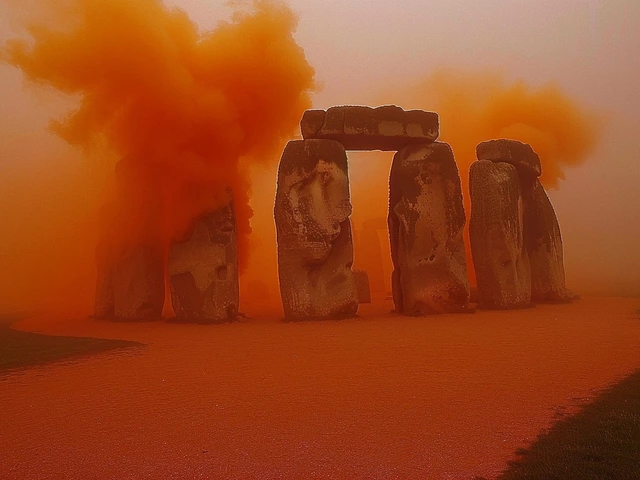Climate Activists Vandalize Stonehenge
In a bold and controversial act of climate activism, two supporters of the protest group Just Stop Oil have left their mark on the ancient monument of Stonehenge. The incident unfolded at around 11 am on Wednesday, June 19, just a day before the Summer Solstice celebrations, a time when the historic site attracts even more attention. The two individuals responsible for the action have been identified as Niamh Lynch, a 21-year-old student from Oxford, and Rajan Naidu, a 73-year-old from Birmingham. Their method was as conspicuous as it was provocative, using orange powdered paint to deface several of Stonehenge's iconic columns.

Urgency of Climate Action
The symbolism of targeting Stonehenge, a site that has withstood millennia, was not lost on Just Stop Oil. The protesters chose the monument to underline their urgent message – the need to phase out fossil fuels to prevent environmental collapse. The group is calling for the incoming government to sign a legally binding treaty to phase out the use of fossil fuels by 2030. The activists argue that the continued burning of oil, coal, and gas will lead to unprecedented levels of death and suffering due to climate and ecological crises.
A High-Profile Platform
By choosing Stonehenge, Just Stop Oil ensured that their protest would capture wide attention. The site is deeply embedded in the cultural and historical landscape of the UK and attracts hundreds of thousands of visitors each year. This makes it an effective platform for raising awareness about the drastic actions required to combat climate change. The group emphasized that their act of vandalism, though dramatic, was carried out using a paint that will wash away with rain, indicating their intent was not to cause permanent damage but to make a statement.
Controversy and Debate
The actions of Just Stop Oil have sparked a heated debate on the methods used by climate activists to draw attention to their cause. While some applaud their determination and the urgency of their message, others criticize the vandalism of a treasured historical site. The incident has drawn attention to the broader question of how far activists should go to put pressure on governments and industries to enact change. English Heritage, the organization responsible for Stonehenge, has been approached for comment but has yet to issue an official statement.
Just Stop Oil's Broader Campaign
Just Stop Oil has made it clear that this act of protest is just one step in their broader campaign against fossil fuels. They have announced plans for continued civil resistance in areas of key importance to the fossil fuel economy worldwide. Their message is consistent: until effective government action is taken to prevent further damage to the environment, they will keep up the pressure through proportional actions deemed necessary.
The Cost of Inaction
The arguments posed by Just Stop Oil highlight the severe consequences of inaction. Scientists and environmentalists agree that burning fossil fuels contributes significantly to global warming, leading to extreme weather events, habitat destruction, sea-level rise, and widespread health issues. The group’s demand for a legally binding treaty to phase out fossil fuels by 2030 is in line with the recommendations of many climate experts who warn that failing to take drastic measures now will lead to a tipping point from which recovery may be impossible.
Public Reactions
Public reaction to the vandalism has been mixed. Some view the act as a necessary wake-up call, a stark reminder of the urgent need to address climate change. Others view it as misguided and counterproductive, arguing that damaging heritage sites detracts from the legitimacy of the climate movement and alienates potential supporters. Social media platforms have become battlegrounds of opinion, with heated discussions on the efficacy and morality of such direct-action tactics.
The Role of Youth in Climate Activism
Niamh Lynch, one of the activists involved, represents a growing trend of youth participation in climate activism. Young people have been at the forefront of movements pushing for environmental justice, motivated by the prospect of inheriting a world in environmental decline. Lynch’s involvement in the protest at Stonehenge underscores the frustration and urgency felt by younger generations who see climate action as inseparable from their future well-being.
Elder Generations Joining The Cause
At 73 years old, Rajan Naidu’s participation in the Stonehenge action shows that climate activism is not confined to the younger generation. Older activists often bring a wealth of experience and a different perspective to the movement. Naidu's actions highlight the intergenerational nature of the climate crisis, reminding observers that the fight against environmental destruction spans age groups and backgrounds.
Moving Forward
As the debate continues, the incident at Stonehenge serves as a stark reminder of the lengths to which some are willing to go to raise awareness about climate change. With the Summer Solstice drawing visitors and attention to Stonehenge, eyes will be on both the historical monument and the broader message of climate urgency it has come to represent, albeit temporarily. It is clear that the urgency for effective climate action is only growing as evidence of environmental damage mounts.
The challenge for governments, organizations, and individuals alike is to navigate the fine balance between raising awareness and fostering constructive dialogue to drive impactful and lasting change. The response to Just Stop Oil’s actions will likely influence future tactics used by activists and shape the narrative around climate change for years to come.





